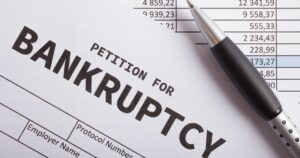What Debts are not Dischargeable in Bankruptcy?
What debts are not dischargeable in bankruptcy? One common misconception among consumers is that you can discharge all debts and be 100 percent debt-free if you file for Chapter 7 bankruptcy. While you could discharge a vast majority of your debtors, the belief that you can remove 100 percent of them is untrue. Many debts are non-dischargeable. And when you have too many in that non-dischargeable category, Chapter 7 may not be the best option for you.
Debts that are not dischargeable have been determined on a federal level, by Congress. The opinion is that a consumer should not be allowed to discharge them as it will affect public policy.
Even if the majority of your debts are non-dischargeable, that doesn’t mean you are without options. Instead of using Chapter 7, you would file for Chapter 13, which allows you to pay down those debts and still receive relief from creditors. It might even be the better option if you want to avoid a full discharge on your credit history.
Understanding the Debts You Can Discharge versus Cannot Discharge
When filing for Chapter 7 bankruptcy, you are under incredible scrutiny by the courts. They not only want to make sure you do not have the financial means to pay off those debts before allowing you to discharge, but they also want to make sure that you are not discharging debts that affect others. For example, if you have outstanding child support payments, you cannot discharge those in bankruptcy at all. The courts still expect you to fulfill that obligation – the same goes for federal student loans or taxes.
Debts You Can Discharge in Bankruptcy
Debts you can typically discharge in Chapter 7 and Chapter 13 are those that do not tie to any court orders or affect public policy, such as:
- Outstanding medical debt;
- Credit card debts;
- Private loans;
- Promissory notes;
- Leases and contracts; and
- Lawsuit judgments with liens.
When filing for Chapter 7 only, the list extends on what you can and cannot discharge. The following cannot discharge in Chapter 7, but you could still apply for repayment through Chapter 13:
- Divorce settlements or agreement debts, such as alimony and child support;
- Debt for taxes;
- Court fees or fines;
- HOA fees;
- Loans from retirement plans; and
- Debts that were part of a past bankruptcy.
Do Not Forget about Newly Acquired Debts
If you acquire new debts, or you forget to include them in your initial filing, then you cannot discharge those debts. Furthermore, if you continue to accumulate debt even after you have filed for bankruptcy, the court may deny your bankruptcy altogether and you may face fraud charges.
Debts That You Cannot Discharge in Bankruptcy
You have some debts that you will never discharge or only those that allow for discharge if you meet very specific requirements.
Debts you can never discharge in Chapter 7 include:
- Child support
- Alimony
- Tax debts (state and federal)
- Fines or penalties from a criminal case
- Restitution in a criminal case
- Debts that resulted from death or injury from a drunk driving accident you caused
In some instances, the court will allow you to still file for Chapter 7 bankruptcy and discharge specific debts, but only if you meet the unique requirements dictated by federal bankruptcy laws.
For example, you can ask that the court discharge student loan debts, but you must convince them that you have no way to repay those debts. That means you have no chance of earning an income, such as becoming permanently disabled. In this case, the court could grant a discharge.
You Might Not Qualify for Chapter 7 Bankruptcy
Before you start calculating which debts qualify for discharge and which do not, you may want to meet with an attorney to see if your financial situation even qualifies you for discharge. Plenty of consumers feel that they live beyond their means, but that doesn’t mean they are a perfect candidate for Chapter 7 bankruptcy. And if you have filed in the past, you might have to wait a few years before you can re-file.
The courts look at your income compared to other incomes in your area along with your debts and disposable income. If you are in over your head because of poor spending choices but not because you do not have the capability of paying off your debts, it is unlikely you would qualify for Chapter 7.
Chapter 13 is an option for those with too high of an income or those who have too many debts that cannot discharge through Chapter 7. In Chapter 13, you create a repayment plan along with your attorney, and then you propose that repayment plan to the court. The court then decides if it is adequate, listens to any creditor objections, and either approves or rejects it.
Once Approved, You Must Make Payments
By agreeing to a Chapter 13 repayment plan, you are agreeing in court that you will repay all debts by making scheduled payments in a pre-agreed amount to the court. A court trustee then distributes that payment to the appropriate parties. Once you have reached the end of your agreement, any remaining debts discharge.
Usually, a Chapter 13 plan takes three to five years, depending on the total amount of debt and the payment amounts. If you find that your financial situation has changed and you cannot make your payments, your attorney will need to approach the court and seek modification – which may not be approved.
Before You Pick Your Route, Speak with a Bankruptcy Attorney
While you may feel that your debts are too much, what you qualify, from a legal standpoint, is not always in line with how you feel. It is imperative that you talk to an attorney to explore your options and see which type of bankruptcy is best.
Contact our offices today to schedule a no-obligation consultation.

